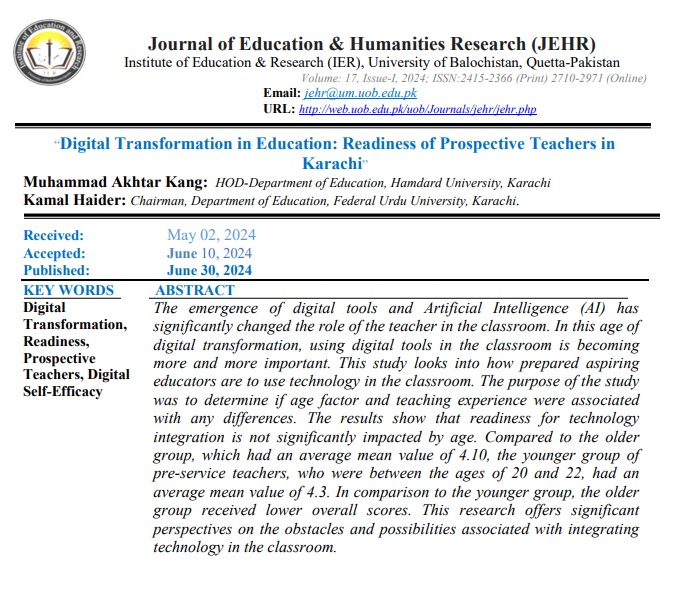Digital Transformation in Education: Readiness of Prospective Teachers in Karachi
Abstract
The emergence of digital tools and Artificial Intelligence (AI) has significantly changed the role of the teacher in the classroom. In this age of digital transformation, using digital tools in the classroom is becoming more and more important. This study looks into how prepared aspiring educators are to use technology in the classroom. The purpose of the study was to determine if age factor and teaching experience were associated with any differences. The results show that readiness for technology integration is not significantly impacted by age. Compared to the older group, which had an average mean value of 4.10, the younger group of pre-service teachers, who were between the ages of 20 and 22, had an average mean value of 4.3. In comparison to the younger group, the older group received lower overall scores. This research offers significant perspectives on the obstacles and possibilities associated with integrating technology in the classroom.
References
Alonso, R., Plaza, I., & Orfali, C. (2019). Barriers in teacher perception about the use of technology for evaluation in higher education. Digital Education Review, 35, 170-185. https://doi.org/10.1344/DER.2019.35.170-185
Altena, S. L., McGuire, A. M., & McAndrew, M. (2017, November). Exploring the adoption of digital learning and teaching technology by health academics. In Higher Education Research Network Conference.
Ara, A., & Aziz, S. A. (2013). Impact of socio-economic status on the enrollment of girls’ students in public sector schools of district west Karachi. Educational Research International, 1(2), 32-38.
Bandura, A. (1977). Self-efficacy: Toward a unifying theory of behavioral change. Psychological Review, 84(2), 191-215. https://doi.org/10.1037/0033-295X.84.2.191
Belda-Medina, J. (2021). ICTs and Project-Based Learning (PBL) in EFL: Pre-service teachers’ attitudes and digital skills. https://doi.org/10.7575/aiac.ijalel.v.10n.1p.63
Borisenkov, V., Gukalenko, O., & Pustovoitov, V. (2021). Digitalization of education: trends in teacher training. In E3S Web of Conferences (Vol. 273, p. 12075). EDP Sciences. https://doi.org/10.1051/e3sconf/202127312075
Compeau, D. R., & Higgins, C. A. (1995). Computer self-efficacy: Development of a measure and initial test. MIS Quarterly, 19(2), 189-211. https://doi.org/10.2307/249688
Davis, F. D. (1989). Perceived usefulness, perceived ease of use, and user acceptance of information technology. MIS Quarterly, 13(3), 319-340. https://doi.org/10.2307/249008
Gerasimova, N., Zuppelo, A., Kulik, A., & Solovjev, D. (2020, December). Peculiarities of Intellectual Development of Human Capital at the Regional Level in the Context of Digital Transformation. In 8th International Conference on Contemporary Problems in the Development of Economic, Financial and Credit Systems (DEFCS 2020) (pp. 157-161). Atlantis Press.
Gupta, M.V., Tiwari, D.R., Ojha, D., Varun, S., R, D., Ts, N.K., & Bahadursha, S. (2023). Paradigm Shift of Digital Education Systems in Indian Education Industry. International Journal for Research in Applied Science and Engineering Technology, 11(4), 2909-2922. https://doi.org/10.22214/ijraset.2023.50759
Gupta, M. M. (2015). Attitude of prospective teachers towards the use of information and communication technology (ICT) in teacher education. International Journal of Scientific Research Engineering & Technology (IJSRET), 117-121.
Gürbüz, T. (2021). Enabling Digital Transformation in Education and Training: Towards Effective Human Capital Development. In Recent Developments in Individual and Organizational Adoption of ICTs (pp. 228-243). IGI Global. https://doi.org/10.4018/978-1-7998-3045-0.ch014
Gülseçen, S. (2019, October). Digital transformation in education: active learners. In International Conference on Technics, Technologies and Education (pp. 14-21). https://doi.org/10.15547/ictte.2019.01.040
Hebbar, C.K., 2020. Impact of Digital India on Education System. International Journal of Case Studies in Business, IT and Education (IJCSBE), 4(2), pp.65-70. https://doi.org/10.5281/ZENODO.3988884
Hilton, J. K. (2008). Narrowing the digital divide: Technology integration in a high-poverty school. In Global Information Technologies: Concepts, Methodologies, Tools, and Applications (pp. 1822-1828). IGI Global.
Jan, A., Sultana, I., & Adnan, M. (2020). Digital Media and Smart Education in Pakistan: Challenges and Prospects for the Teachers in the Age of E-Learning. Global Educational Studies Review, 4, 51-59. https://doi.org/10.31703/GESR.2020(V-IV).06
Jha, A. K. (2020). Digital Transformation Initiatives in Indian Higher Education: A Critical Analysis from Pedagogic Perspectives. Русская политология, 2 (15), 53-61. https://doi.org/10.51180/rps.2020.15.2.004
Kaarakainen, M. T., & Saikkonen, L. (2022). Remark on digital accessibility: educational disparities define digital inclusion from adolescence onwards. Universal Access in the Information Society, 1-14.
Limone, P., & Pace, R. (2016). Teacher training and digital paths. Revolution in the school: A project for lifelong learning. International Journal of Digital Literacy and Digital Competence (IJDLDC), 7(1), 1-18. https://doi.org/10.4018/IJDLDC.2016010101
Malik, M., Raziq, M. M., Allen, M. M., & Ahmad, M. (2022). The Digitalization of Pakistan's Universities: An Opportunity to Re-Focus and Re-Purpose Toward Hybrid Learning. In Global Trends, Dynamics, and Imperatives for Strategic Development in Business Education in an Age of Disruption (pp. 171-188). IGI Global. https://doi.org/10.4018/978-1-7998-7548-2.ch009
Prensky, M. (2001). Digital Natives, Digital Immigrants. On the Horizon, 9(5), 1-6.
Reimann, N., Fabriz, S., & Hansen, M. (2021). The importance of national and institutional context: implications for research on teaching development programs. Journal of Further and Higher Education, 45(4), 511-523.
Rodrigues, A. L. (2020). Digital technologies integration in teacher education: the active teacher training model. Journal of e-learning and knowledge society, 16(3), 24-33.
Selwyn, N. (2017). Education and technology: Key issues and debates. London: Bloomsbury Publishing.
Shahzad, M., Hassan, A., & Nadeem, M. A. (2021). Education on The Path to Digital Media transition, A Perspective of Pakistani Education in 2030. Journal of Peace, Development and Communication, 05(02), 241–258. https://doi.org/10.36968/jpdc-v05-i02-22
Sousa, R. D., Karimova, B., & Gorlov, S. (2020). Digitalization as a new direction in education sphere. In E3S Web of Conferences (Vol. 159, p. 09014). EDP Sciences. https://doi.org/10.1051/e3sconf/202015909014
Vezirov, T., Gish, T., Elmawla, V., Kuzmenko, L., & Krivolapovab, O. (2020). Professional Training of Masters in the Conditions of Digital Transformation of Education. In CEUR Workshop Proceedings (pp. 132-138).
Vindača, O., Ļubkina, V., Žogla, I., & Prudņikova, I. (2020). Effective digital transformation in the context of higher education. In EDULEARN20 Proceedings (pp. 1027-1036). IATED. https://doi.org/10.21125/edulearn.2020.0354




